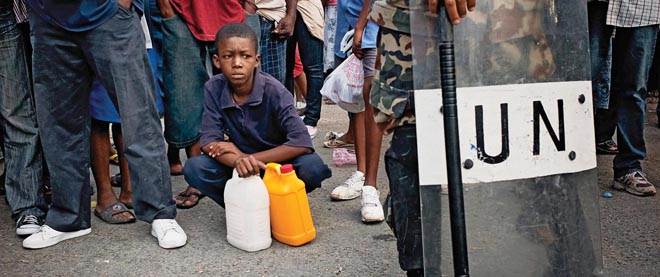Look what the UN dragged in
Haiti had not seen a case of cholera in over 100 years—until ‘help’ arrived
Haitians queue for aid by a UN peacekeeper at a distribution point in Port-au-Prince on January 31, 2010. Quake-hit Haiti will need at least a decade of painstaking reconstruction, aid chiefs and donor nations warned, as homeless, scarred survivors struggled today to rebuild their lives. AFP PHOTO / JEAN-PHILIPPE KSIAZEK (Photo credit should read JEAN-PHILIPPE KSIAZEK/AFP/Getty Images)
Share
After an earthquake ravaged Haiti on Jan. 12, 2010, no one could have imagined that cholera—absent from the country for more than a century—would claim the lives of thousands more Haitians. Yet some 7,400 Haitians have died from cholera since the epidemic began in October 2010; and more than 600,000 have been infected. Now, new evidence is pointing the finger at the UN for bringing the disease into the country.
Last month, Daniele Lantagne, a top U.S. cholera specialist, told the BBC that a Nepalese military unit of the UN Stabilization Mission was the “most likely” source of the outbreak; the strain of cholera found in Haiti is “an exact match,” she says, for the strain found in Nepal. At the time of Haiti’s earthquake, Nepal was in the grip of a cholera outbreak. None of the soldiers were tested because they didn’t display the symptoms of the disease (it is possible to carry cholera without showing symptoms).
Rumours that UN peacekeepers were to blame for the outbreak have long circulated in Haiti, but an independent report last year concluded that the peacekeeping agency could not conclusively be blamed. While UN personnel may have had a hand in introducing the disease, the report found that Haiti’s lack of proper sewage treatment and water purification was also at fault; the disease, found in water or food contaminated by the waste of those infected, can quickly spread in places with poor sanitation. As for the alleged negligence in not testing the peacekeepers, Kieran Dwyer, the UN’s chief of public affairs, says the World Health Organization has no recommended “reliable cholera screening tool.”
The outbreak was chronicled in Baseball in the Time of Cholera, a documentary short by David Darg and Bryn Mooser. The two U.S. directors, who moved to Port-Au-Prince after the quake, have seen cholera’s rising death toll first-hand. The film, says Darg, was made, in part, to keep “pressure on the UN.” Mooser thinks the organization is likely afraid of setting a “dangerous precedent” by admitting fault. “From a public relations standpoint, they would like the public to think there’s always a possibility it wasn’t them,” says Mooser.
In November 2011, legal claims were filed against the UN on behalf of the victims by the Institute for Justice and Democracy in Haiti. The institute’s director, Brian Concannon, says the claims are on behalf of 5,000 families of victims of cholera.
Plaintiffs, however, face an uphill battle: the organization and its personnel have immunity from legal actions in the member states where they work. Indeed, Concannon says he has heard little from the UN since filing the claims: “They don’t seem keen on contacting us.”
